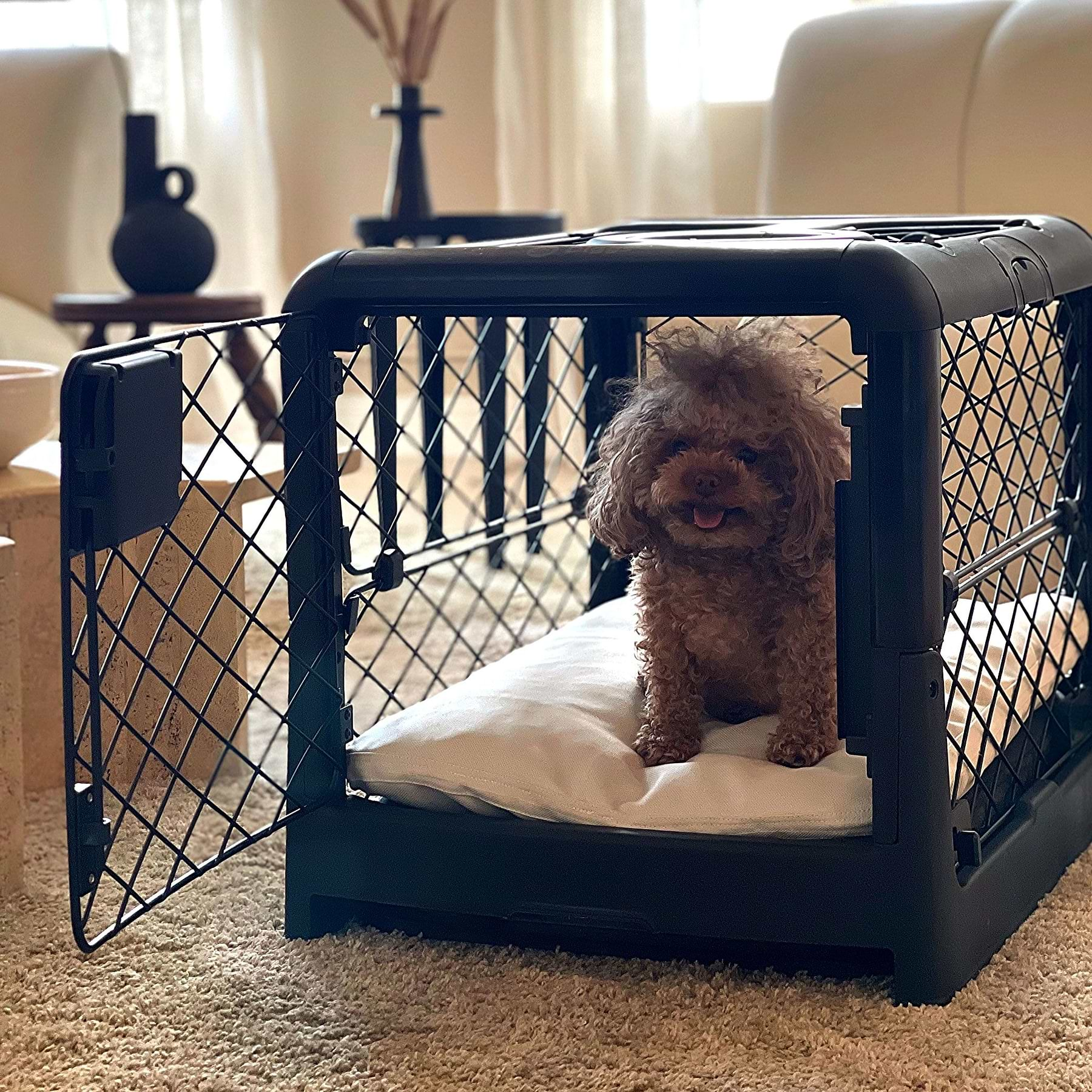Our dogs regularly display a plethora of behaviors that might seem odd at first glance. On the bright side, many of these strange rituals are generally cute enough for us to chock it up to them being quirky and endearing. However, there are some other behaviors that just seem so strange and nonsensical that we are inevitably left with questions. There are few typical dog behaviors that this is more true for than when they begin frantically digging and scratching at their beds.
To us pet parents, this digging really does not seem to make much sense. They do not seem to be digging to destroy the soft surface, and it clearly is not an aggressive response, as they will often cuddle up on the bed soon after. When we see our beloved pets perform such a strange behavior over and over again, it stands to reason that we would have some concerns.
For instance, is this digging normal, or is it a cause for alarm? Is this something that should be discussed with a vet, or a sign that this dog is distressed? Do other dogs do this, and if so, why?
If you have ever wondered about your dog’s peculiar digging habits, this is definitely the article for you.
Is It Normal for Dogs To Dig in Their Beds?
The first question on many pet parents’ minds when first witnessing their dog digging in their bed is a simple one: is this normal? The good news is that this behavior is typically completely normal, and is one that can be seen in many different kinds of dogs. Scratching and digging at their beds is one of many bedtime rituals your dog may take part in.
Just like how we as humans brush our teeth, wash our face, and change into pajamas, dogs may scratch at their bed and then proceed to spin in a circle half a dozen times until eventually settling down. We all have our own self-soothing rituals, and dogs are absolutely no exception to that rule.
What Kinds of Dogs Dig in Their Beds?
Digging is a behavior that seems to transcend dog size, breed, gender, age, and any other demographic. Dogs of any kind can and probably will dig, as it is simply in their nature (but more on that in a bit). That said, there are certain types of dogs that are more likely to dig in their beds.
These dog breeds are not specifically trained to dig into their beds, but they have been bred over many generations to dig in general (for instance, breeds such as terriers, beagles, and basset hounds). Then, there are dogs that dig in order to make their environment more hospitable and comfortable, like Siberian huskies and Alaskan Malamutes.
Why Do Dogs Dig in Their Beds?
A common misunderstanding of the nature of why dogs dig in their beds is that pet parents think of it as an inherently destructive act. In reality, our dogs are generally not taking part in this activity to cause any harm.
Instead, they are simply acting according to what their instincts are telling them. Though these instincts may have started primarily as a means of digging through the dirt to find food, they have evolved since then.
There are situations where digging into a bed can be indicative of some kind of stress or territorialism (more on that later), but most of the time this is just your dog being one with their roots as a wild wolf. While it is true that a five-pound Chihuahua might look just about as far from a proud wolf as possible, their undomesticated origins can still be seen in these types of behaviors.
What Instincts Cause Dogs To Dig in Their Beds?
Now that we know many of the possible motivations behind a dog scratching and digging into their bed are inspired by their basic instincts, it is time to get into exactly what those instincts are.
To Mark the Bed With Their Scent
This reason for scratching at their bed could be somewhat territorial in nature, or it could simply be your dog’s way of leaving their mark. While there are many more unsavory ways that dogs can spread their scent, they also have scent glands in their paws. As a result, the act of digging also works to imprint some of their unique smell onto surfaces.
Your dog could be spreading their scent to tell other dogs and animals to keep away, but if they do not exhibit any other territorial behaviors, this is likely not the case. Besides, we would all much rather they paw at their beds than opt for any of the other traditional and much less cute scent-marking behaviors.
They Want To Burrow or Hide
Another possible instinctual reason for a dog digging in and around their bed is that they want to hide. They could be seeking to hide either themselves or some kind of object or toy that they are trying to keep safe. Even if they do not perceive an active threat, many dogs still have a present instinct telling them to burrow underground.
To Change the Bed’s Temperature and Make It More Comfortable
Like we mentioned before, dogs like Siberian huskies and Alaskan Malamutes are very likely to dig, as it is in their blood. Both of those breeds originate from intensely cold and harsh climates. In order to make it warmer and more hospitable, they would often dig small holes where they could rest and preserve more body heat.
While your chocolate lab may be in their cozy bed, just about as far away from the frozen tundra as can be, they may still be experiencing some of these residual instincts. Pawing around the bed can also serve to make it warmer or cooler, depending on what your dog wants and how they execute this behavior.
In Preparation for Puppies
The last instinctual possibility that we are going to cover is that your dog is about to give birth to puppies. If this is the case, the mom is likely working with instincts telling her to dig a safe place underground to have her litter far away from any predators. Hopefully, if this is the reason your dog is digging around their bed, the reason why is not a surprise.
What Else Can Cause a Dog To Dig in Their Bed?
It is true that the majority of reasons a dog will dig in their bed are instinctual in nature, but there are still some other motivations that are not uncommon.
They Are Feeling Some Kind of Heightened Stress or Anxiety
Digging is often a behavior passed down through generations of dogs, but it can also act as a self-soothing mechanism. If your dog has never dug in their bed before but suddenly starts, this could be indicative that they are experiencing unpleasant stress. If you suspect this is the case for your dog, try to help them relax and destress. If that was truly the cause of the digging, then calming them down should ease the issue.
Copying Behavior They Have Seen in Other Dogs
It is also possible that your dog has simply witnessed other dogs digging outside or in their beds and seeks to repeat the behavior. This could be especially true in puppies, or dogs just gaining their confidence.
Should You Train Your Dog Not To Dig in Their Bed?
Since most of the reasons that dogs dig are because of their inherent nature, it is very difficult to train your pet to no longer do it. Instead, you can redirect their digging to a more appropriate place such as a sandbox or other designated spot outside. Be patient, and hold onto the understanding that this is part of what dogs do, and as a result, you will never be able to break them of the habit completely.
What Beds Can Withstand Your Dog’s Scratching?
Once you understand that a dog’s digging is more than likely an instinctual response, and one that cannot be retrained as much as it can be redirected, it is time to move on to the next step. It is entirely possible that the dog’s digging is not actually the problem, but rather the quality of their bed is too poor to handle it.
Snooz, Pillo, and Bolstr: Designed for Comfort and Durability
The Snooz Crate Pad: Ideal for the comfort-seeking digger, the Snooz pad is crafted with luxurious, orthopedic memory foam. It's not only comfortable for those dogs that dig to find the coziest sleeping position but also tear-resistant. This means it can withstand the enthusiastic digging of your furry companion without falling apart.
The Pillo Dog Bed: For the more vigorous diggers, the Pillo offers an ultra-durable and adaptable solution. Its tough exterior and plush filling accommodate natural nesting and burrowing instincts. Plus, its waterproof and washable features make maintenance a breeze for pet parents.
The Bolstr Dog Bed: If your dog loves to burrow and needs added comfort, the Bolstr bed is the perfect choice. It features a bolstered headrest for your dog to snuggle against and a water-repellent, durable fabric. This bed is not just a comfortable haven; it's also practical for both in-crate and standalone use
Can You Dig It?
Digging is simply a part of what dogs do, even though there may be times that it is slightly hard for us to understand. As pet parents, it is our duty to provide them with the proper resources to perform their digging as they see fit, and redirect that attention to other sources when needed.
Sources:
Dogs and Destructive Digging | VCA Animal Hospital
Why Does My Dog Dig? Identify and Channel Your Dog’s Digging Instincts | American Kennel Club
Ground Scratching by Dogs: Scent, Sight, and Ecstasy | Psychology Today

The Diggs Team
We believe our dogs deserve safer, better designed pet products.
You might also like
Crate training tips, stories and inspiration
View all blogsIn Your Diggs
Share your photos with #DiggsPet and tag us @DiggsPet on IG and TikTok.



